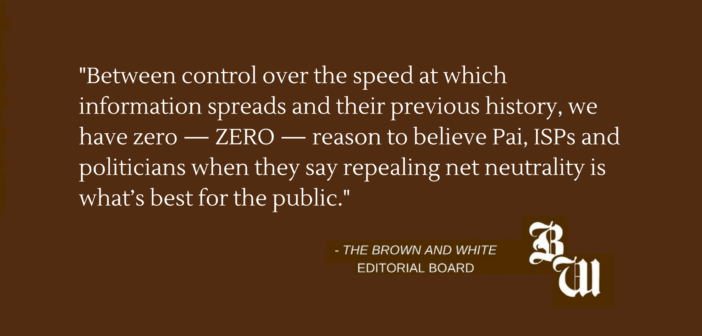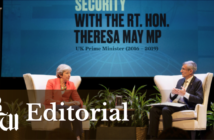Ajit Pai, chairman of the Federal Communications Commission, spoke with members of the press on April 20.
Pai casually joked with reporters as they began to ask their questions. Each new voice was greeted with a rise of the eyebrows and an encouraging smile.
“I will say everybody in this commission favors a free and open internet,” Pai said, responding to a question on criticism against the FCC’s planned repeal of net neutrality. “We had that prior to 2015 when these regulations were adopted on a party line vote. Everybody needs to recognize there is common ground here.”
There’s two problems here. First, there is overwhelming public support for net neutrality. Second, Pai, a former lawyer for Verizon, is lying.
To understand how we got here, we need to clarify what net neutrality means in the first place.
Net neutrality “is the principle that Internet service providers (ISPs) should give consumers access to all legal content and applications on an equal basis, without favoring some sources or blocking others.”
On Dec. 14, the FCC will vote on a repeal of net neutrality.
Without net neutrality, ISPs will be allowed to divide Internet access into “fast lanes,” where companies like Verizon and Comcast could prioritize access to favored websites, and “slow lanes,” where other big-name companies like Time Warner Cable and AT&T could establish “choke point(s) to extract fees from websites or to slow down certain sites.”
ISPs will also be allowed to bundle websites into premium subscription packages users can select, such as a social bundle with Facebook and Twitter or a music bundle with Spotify and SoundCloud. Pai claims theses bundles would exist so “consumers can buy the service plan that’s best for them.”
If this sounds like a crazed fantasy, look no further than Portugal. Its wireless carrier, Meo, implemented the same bundle system American ISPs are now discussing. A two-tiered system of prioritized big-name apps versus slowed upstart challengers is widely argued to be damaging to the internet and consumers in the long run.
Pai’s denouncement of net neutrality isn’t the first assault on a free and open internet. Former FCC Chairman Tom Wheeler pushed for a repeal in 2014, eventually voting “to delay adopting a policy on net neutrality for 120 days,” during which members of the general public could give their opinions.
The response, just like in 2017, was overwhelmingly negative. A survey conducted by the University of Delaware found 81 percent of people — “regardless of gender, age, race and level of education” — opposed the “fast lane, slow lane” approach.
Wheeler eventually came to support the public’s opinion, approving the 2015 Open Internet Order under the Obama administration. Since then, Wheeler has been an outspoken critic of Pai and his plans to dismantle net neutrality.
Admittedly, the internet has never truly been neutral. As early as 2006, major websites like Facebook and Google have been able to pay for separate content delivery networks, which are large companies that construct servers across the country to handle website data.
But a repeal of net neutrality means a breakdown of the rules and regulations that prevent corporations from gaining even more power than they already have.
So, who does a repeal of net neutrality actually hurt?
Start-ups and small, non-market leaders
Small businesses are scared, to put it lightly. According to government statistics, 99.7 percent of U.S. businesses have 500 employees or fewer, while 80 percent, or 23 million businesses, are run by a single individual.
These businesses exist in the free market today because of net neutrality rules. Without them, reaching potential consumers would take considerably more time, effort and resources. Small operations rely on unfettered internet access for consumers to, well, consume.
Equal broadband speeds are especially essential for small tech startups fighting to stay competitive among huge corporations with deep pockets and prioritized internet access. Without net neutrality, ISPs have zero incentive to promote companies that aren’t included in provided subscription bundles.
Consumers are then stuck with two options: pay more for a single start-up’s service that is slower and more frustrating to access, or stay with a simpler subscription service.
Universities and research institutions
In the same way large corporations have a huge pool of funds for the fast lane, private universities and research institutions have huge endowments for their students’ internet access.
Jon Fansmith, director of government relations at the American Council on Education, says the massive bandwidth cost would likely be passed on to students “for no appreciable benefit.” Larger public schools like Penn State or the University of Texas System would likely be subject to a huge disadvantage: increase student tuition and further widen the college wealth gap, or deter students from attending schools with drastically reduced internet speeds in the first place.
Distance education, school for students who can’t always be physically present on campus, will suffer as well. A 2014 report by the National Center for Education Statistics found that 28.5 percent of all students enrolled in degree-granting postsecondary institutions had taken at least one distance education course. Janna Anderson, a professor of communications and the director of the Imagining the Internet Center at Elon University, said the “added costs and complexities that may accompany a rejection of net neutrality principles will make it difficult to develop and implement these education innovations and deliver them to the public.”
Students are stuck with two options: pay even more toward the abhorrent cost of higher education, or lag behind in the slow lane.
Everyone else
The internet is, on a fundamental level, a platform for free speech.
In the same way people gather for town halls to argue over local issues, users of social media like Twitter, Reddit and Facebook log in to voice grievances, for better or worse, on a national and international scale. A free flow of information allows science, technology and knowledge to be rapidly shared across the globe.
Restricting our right to a free internet, when it has undeniably contributed to the progress of humanity, seems cartoonishly evil at best and inhumane at worst.
So, why should we be worried?
Opening Pandora’s box
The fear of a net neutrality repeal isn’t because of its possible initial impacts, but rather the dangers of a “worst-case scenario.”
If information can be selectively placed into fast and slow lanes, ISPs looking to increase profits have every incentive to slowly jack up prices without improving bandwidth. Regional providers like Time Warner Cable have already done this with their cable services.
The next logical step for ISPs are politically or ideologically motivated attacks on businesses and online forums. ISPs are essentially asking us to trust they won’t surrender public information to parties, Democrats and Republicans alike, unless government deems it necessary.
The big picture
You might think this is hyperbole, which is fine — after all, worst-case scenarios rarely play out in full.
But make sure to keep three things in mind before you decide you’re willing to open that box.
- FCC Chairman Pai is a former Verizon lawyer, appointed by Donald Trump, a president with a growing track record of political decisions benefiting the wealthiest of our country. Pai is arguing, against a vast majority of the population, that repealing net neutrality lets “consumers decide who wins and loses.”
- ISPs like Verizon and Time Warner Cable seem to be the only groups that benefit, in any way, from a net neutrality repeal. Comcast walked back its pledge to uphold net neutrality less than 24 hours after Pai’s announcement of the repeal.
- Two hundred and sixty-five members of Congress, all Republicans, sold their constituents to ISPs. The price of their support ranges from as much as $251,110 paid to Sen. Mitch McConnell, to as little as $300 paid to Rep. Clay Higgins.
Between control over the speed at which information spreads and their previous history, we have zero — ZERO — reason to believe Pai, ISPs and politicians when they say repealing net neutrality is what’s best for the public.






Comment policy
Comments posted to The Brown and White website are reviewed by a moderator before being approved. Incendiary speech or harassing language, including comments targeted at individuals, may be deemed unacceptable and not published. Spam and other soliciting will also be declined.
The Brown and White also reserves the right to not publish entirely anonymous comments.
1 Comment
I don’t know if cable TV would be a valid example of what the outcome would be but it is obvious what kinds of choices large companies would like to provide. A relatively high cost starting point for a basic service with jumps in cost for levels of service. The consumer is left to accept what the company offers rather than being able to personally manage choices.
Companies charge for 24 hour services when individuals can only use a portion of that time. Some phone companies make reasonable charges for limited usage unlike any cable TV system that I know of.
The actions of Mr. Trump and Congress in these matters seem to be business as usual. I am thinking if we formed Congress, or a part of it, in the same manner as jury selection we might get some people more interested in benefits to the general population than to special interest groups (if we could count on them to not be bought by the special interest groups). Term limits would probably be worth while to limit the financial incentives to obtain money for reelection. Money seems to buy power and power seems to attract money. Originally Congress was to provide character.